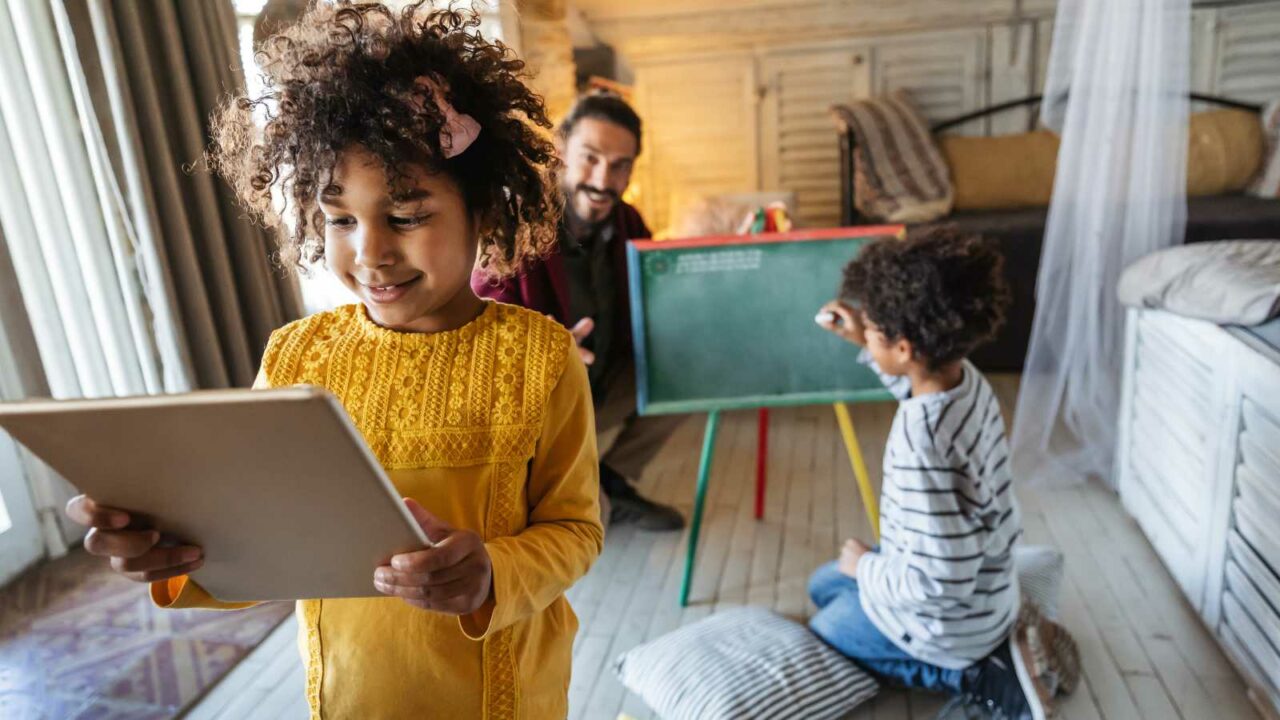
Screen Experts’ Advice to Parents
The original text in Norwegian.
«The Screen Use Committee» is the Norwegian government’s expert group on screen usage among children and youth. Below are the committee’s recommendations for parents.
Some translations may be flawed or inaccurate. «Kids and Media» has no control over the translation, but we appreciate feedback: post@barnevakten.no.
Children under 2 years
- Screen use is likely not beneficial for children’s development in their first two years and should therefore be very limited.
- Adults should minimize their own screen use when spending time with children and reduce notifications on their devices.
- TVs and other large screens should not be left on in the background where children are present.
Children aged 2 to 5 years
- Screen use should be balanced with activities that promote development and learning. It should not interfere with sleep, meals, play, physical activity, or social interactions with other children and adults.
- Screens should not occupy a significant part of the child’s active leisure time. What children watch and do on screens should be age-appropriate and preferably supervised by adults.
- Adults should limit their own screen use when around children and reduce notifications on their devices. TVs and other large screens should not be left on in the background.
- Children should avoid screen use before bedtime and should not have access to digital devices during sleep.
- Avoid screen use during meals at home, in daycare, at school, or in after-school programs.
Children aged 6 to 12 years
- Screen use should be part of a day that allows adequate time for sleep, meals, play, schoolwork, physical activity, and social interactions with family and friends.
- There should be screen-free zones in children’s lives, both at school and home, such as during meals, shared activities, and sleep times.
- Parents, teachers, and other adults should help children balance screen use with other activities.
- Parents should involve children in creating family screen-use rules and explain why maintaining balance in daily life is important.
- Parents should engage with and be aware of what children do and who they interact with on digital platforms. Content should be age-appropriate.
- Parental control settings should be used, and notifications on children’s devices should be minimized. Age restrictions for digital services and games should generally be followed.
- Collaboration among parents, facilitated by schools or parent associations, should establish shared guidelines for screen use during leisure time and develop “digital etiquette” rules for online behavior.
- Parents should be involved in their children’s digital school life and familiarize themselves with digital tools and learning resources.
- Adults should set good examples by limiting their own screen use when with children.
- Children should avoid screens before bedtime and not have access to devices during sleep.
- Children should be encouraged to focus on one screen and one activity at a time. This also applies at school. Long reading is best done on paper, and screens should be set aside for better concentration on extended texts.
- Screen use during meals, both at home and in school settings, should be avoided.
Teenagers aged 13 to 19 years
- Screen use should be part of a balanced life, with sufficient time for meals, schoolwork, physical activity, socializing with friends and family, and sleep.
- There should be screen-free zones in teenagers’ lives, both at school and home, during meals, shared activities, and sleep times.
- Adults should model good behavior and help teenagers develop healthy screen-use habits in family, social, and school settings.
- Parents should involve teenagers in creating family screen-use rules and explain why balance in daily life is important.
- Parents and other adults should engage with teenagers and discuss their activities on digital platforms.
- Adults should provide support and ensure teenagers have the knowledge to self-regulate their screen use.
- Age restrictions for apps and services should generally be followed. Adults should guide teenagers to ensure their screen activities are age-appropriate.
- Parental controls should be used for younger teens, and notifications should be minimized.
- Parents and other adults should model appropriate online behavior and teach teenagers about respectful digital communication.
- Parents should familiarize themselves with teenagers’ digital school activities, including tools and learning platforms.
- Adults at home and school should guide teenagers to focus on one screen activity at a time when concentration is needed. Long reading is best done on paper, and screens should be set aside for extended text work.
- Parent collaboration through schools or parent organizations should establish “digital etiquette” rules for online behavior.
The committee’s released 280-page report in Nowember 2024. Read more about the report in Norwegian here.
Photo Credit: Shutterstock / NDAB Creativity


